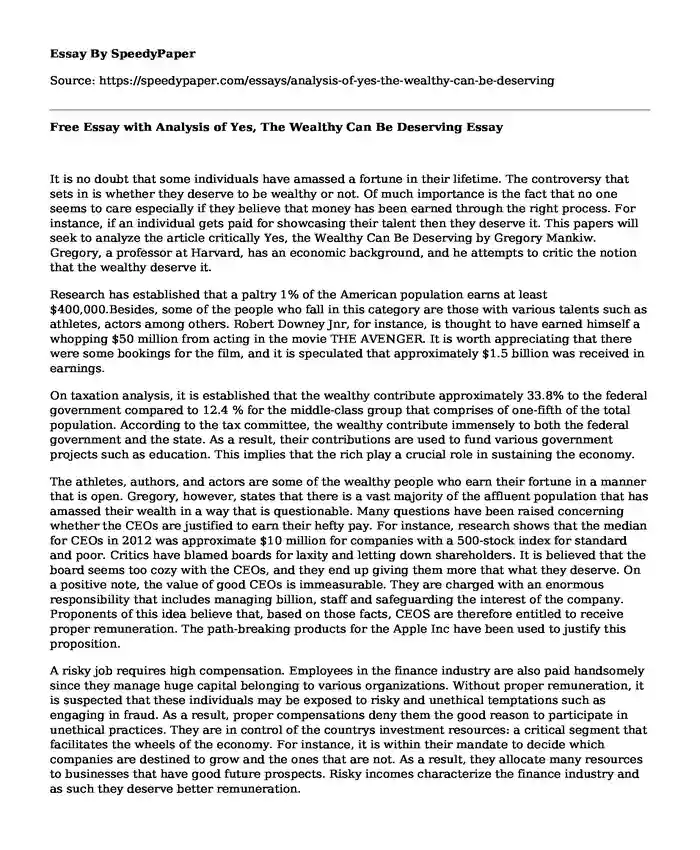It is no doubt that some individuals have amassed a fortune in their lifetime. The controversy that sets in is whether they deserve to be wealthy or not. Of much importance is the fact that no one seems to care especially if they believe that money has been earned through the right process. For instance, if an individual gets paid for showcasing their talent then they deserve it. This papers will seek to analyze the article critically Yes, the Wealthy Can Be Deserving by Gregory Mankiw. Gregory, a professor at Harvard, has an economic background, and he attempts to critic the notion that the wealthy deserve it.
Research has established that a paltry 1% of the American population earns at least $400,000.Besides, some of the people who fall in this category are those with various talents such as athletes, actors among others. Robert Downey Jnr, for instance, is thought to have earned himself a whopping $50 million from acting in the movie THE AVENGER. It is worth appreciating that there were some bookings for the film, and it is speculated that approximately $1.5 billion was received in earnings.
On taxation analysis, it is established that the wealthy contribute approximately 33.8% to the federal government compared to 12.4 % for the middle-class group that comprises of one-fifth of the total population. According to the tax committee, the wealthy contribute immensely to both the federal government and the state. As a result, their contributions are used to fund various government projects such as education. This implies that the rich play a crucial role in sustaining the economy.
The athletes, authors, and actors are some of the wealthy people who earn their fortune in a manner that is open. Gregory, however, states that there is a vast majority of the affluent population that has amassed their wealth in a way that is questionable. Many questions have been raised concerning whether the CEOs are justified to earn their hefty pay. For instance, research shows that the median for CEOs in 2012 was approximate $10 million for companies with a 500-stock index for standard and poor. Critics have blamed boards for laxity and letting down shareholders. It is believed that the board seems too cozy with the CEOs, and they end up giving them more that what they deserve. On a positive note, the value of good CEOs is immeasurable. They are charged with an enormous responsibility that includes managing billion, staff and safeguarding the interest of the company. Proponents of this idea believe that, based on those facts, CEOS are therefore entitled to receive proper remuneration. The path-breaking products for the Apple Inc have been used to justify this proposition.
A risky job requires high compensation. Employees in the finance industry are also paid handsomely since they manage huge capital belonging to various organizations. Without proper remuneration, it is suspected that these individuals may be exposed to risky and unethical temptations such as engaging in fraud. As a result, proper compensations deny them the good reason to participate in unethical practices. They are in control of the countrys investment resources: a critical segment that facilitates the wheels of the economy. For instance, it is within their mandate to decide which companies are destined to grow and the ones that are not. As a result, they allocate many resources to businesses that have good future prospects. Risky incomes characterize the finance industry and as such they deserve better remuneration.
Some people get rich at the expense of others. This, therefore, calls for oversight and strict regulation by the tax agency. According to the tax policy center estimates, those individuals who earned more than $2.7 million contributed 33.8% in the form of taxes to the federal government. The significance of this is that it shows there is a mechanism to ensure that wealth is distributed evenly. The rich tend to contribute more to the economy as compared to the middle class and the poor. The middle class, for instance, follows a distant 12.4 % of the money paid in the form of taxes to the federal government.
The implication is that high-income earners lead in contributing to the federal and state economies. When individuals engage in various activities that generate revenue such as acting, they collect huge returns that then trickle down to the ordinary man who is unable to meet basic needs. Money collected by the government is useful in driving the wheels of the economy.
In conclusion, Gregory's concern is to highlight the income parties that exist within the society and how regulations and oversight have helped to distribute wealth across all social classes. He appreciates that a good number of individuals earn a living in a more transparent manner while significant other does not. Besides, he states that proper regulations are instrumental in ensuring that resources owned by a few rich people are used to provide services to the vast majority poor people.
Cite this page
Free Essay with Analysis of Yes, The Wealthy Can Be Deserving. (2019, May 29). Retrieved from https://speedypaper.com/essays/analysis-of-yes-the-wealthy-can-be-deserving
Request Removal
If you are the original author of this essay and no longer wish to have it published on the SpeedyPaper website, please click below to request its removal:
- Essay Example on Criticism about The Aged Mother
- Free Essay from Our Database: Ethical Practice in Macro Social Work
- Free Essay Sample on Australian Legal System
- Free Essay on Organizational Management and Culture
- Nutrition Essay Sample: Interview with Obese Person
- Free Essay. Reengineering of Health Care
- Free Essay: Organizational Behavior Post Test
Popular categories





